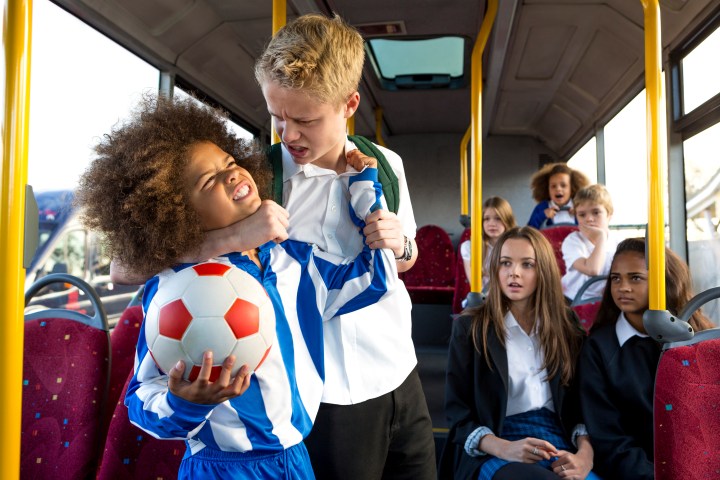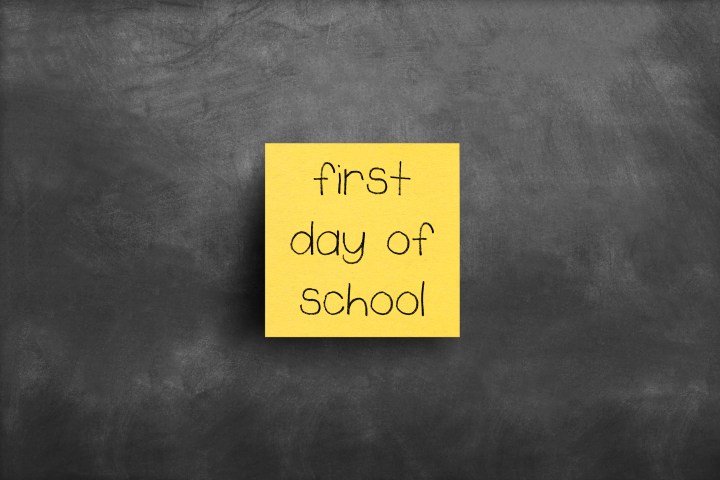How to prepare your child for the move to high school

Time passes in the blink of an eye. Surely it was only yesterday when that warm, mewling bundle was placed in your arms, eyes fixing on yours with all the intensity and knowing of an old soul who has lived many times before, yet in a tiny body, so fragile and new. Then bam, before you can take a breath, you catch a glimpse of your child as the teenager they will soon be. A certain way they hold their jaw, peer through their impossibly long eyelashes or throw their head back as they laugh. And all at once, you realise that the baby is no more.
Preparing for the move to ‘big school’
Can you remember how you felt in the months before starting at secondary school? I felt excited, but also worried and scared: fearful of the size of the school in relation to my comparatively tiny primary school, worried about getting lost and anxious that I wouldn’t be able to keep up with the work. I was also concerned about making friends and fitting in, frightened I would get the wrong bus home and nervous about navigating lunchtimes in the huge canteen. Of course, my fears were unfounded; within a month, I had formed new friendships, knew my way around easily and was loving the challenge of learning new subjects. The same was true for all my children. But despite knowing that our tweens will be fine, we must not dismiss their fears.
The following are some of the most common anxieties tweens experience before the move to a new school, according to research:
Making new friends.
Learning new academic subjects.
Meeting new teachers.
Getting used to a new routine.
The increased size of the new school and the number of children in it.
Whatever worries tweens may have about the transition to a new school, the two most important responses from parents and carers are, firstly, to listen and, secondly, to empower them to cope with their concerns. The following tips can help with the latter:
- Reassure your tween that all new starters will have worries, even those who look cool, calm and collected on the outside. Help them to understand that a degree of apprehension is totally normal with such a big transition ahead of them.
- Give your child a little notebook and suggest that they write down any concerns or questions they have. You can check on their questions every couple of days – or daily, if you think that would be better – and if you don’t know the answers immediately, promise you will find out for them as soon as you can.
- Even if the school is running settling-in sessions, ask if you can have a video tour of the building, or at least some photos of your child’s new form room and form tutor. Familiarising themselves with these before the beginning of term can help them to feel more comfort- able when they start.
- Do let your tween’s form tutor and whoever is responsible for student wellbeing know if they are feeling very anxious before starting. Often, schools have special settling-in procedures for tweens who they think will struggle.
- Try to buy any uniform needed several weeks before the start of term, so that your tween can wear it around the house, including new shoes (blisters in the first week aren’t fun). If they must wear a tie as part of their new uniform, keep practising at home until they are a pro at tying it.
- See if you can find other new starters and arrange a lunch date with them before term begins. Local social-media groups are good for linking up with other parents.
- Make sure your tween knows where to go and who to ask for help at school if they are lost or feeling out of their depth. Also, check that they know what to do if they feel ill or are in pain (including period pain) while at school. Usually, this will be a visit to the school nurse’s office.
- Try to focus on the positives. Ask your tween what they are most looking forward to about starting their new school. Speak about the new opportunities they will have and the activities they love. You could also find out what lunchtime and after-school clubs will be running and share the list with your tween, to build excitement.
- Try to get hold of a map of the school before they start, so they can familiarise themselves with the entrance, their form, the school hall, the canteen and the toilets.
- Do a couple of practice runs of their school journey, especially if your tween will be using public transport or walking.
- Try to get them as organised as possible before starting, checking that they have the right stationery and equipment packed in their bag, so that everything they need will be to hand.
- Give them some coping mechanisms for when things feel a little too much.
Of course, the above tips have focused solely on helping your tween to cope with the transition to a new school, but it’s import- ant not to forget what a big experience it is for you, too. Try to attend any new parents’ information evenings and take advantage of offers to chat with form tutors before, or soon after, your tween starts school. Most schools will run a parents’ evening towards the end of the first term, which will give you an opportunity to meet your tween’s teachers and hear about how they are settling in. I think one of the hardest things about being a parent or carer to a tween at secondary school is having far less involvement with school than you had previously. It feels strange not knowing their teachers well or what room they will be in at any given time. You do get used to the change, but it can often take parents longer than tweens to feel at peace with the transition.
For more advice on helping your tween navigate their way through life read Sarah’s brilliant new book Between: A guide for parents of eight to thirteen-year-olds. To find out more about Sarah visit www.sarahockwell-smith.com
'Full of practical parenting advice that will give you the tools to guide your child through this time' Daily Express
Raising a tween can often leave you feeling like a parenting beginner all over again. Children in the 'between' stage seem to change almost daily, leaving many parents struggling to understand the child they once thought they knew so well. In Between, parenting expert and mother of four Sarah Ockwell-Smith uses a unique blend of the biology, psychology and sociology of adolescence as the basis for practical parenting advice that you can use to help your child through the transition from childhood to adulthood.
It explores key issues, including:
*Why tweens can often be moody, rude, lazy and impulsive - and how to cope with their behaviour
*What exactly happens during puberty - and when and how to talk to your tween about it
* How to navigate friendships and romantic relationships in the tween years
*How to encourage good mental health and body image
*Managing screen time and avoiding common pitfalls
*Supporting the transition to secondary school
Between also offers advice on coping with your own feelings as your child moves through this busy developmental period, and how to let go and give them wings to fly. The tween years can be a difficult period for parent and child alike, but your openness and support is key to building the relationship that you will have with your child for the rest of their life. Between is the handbook that will guide you across the bridge from childhood into adolescence, together with your child.








